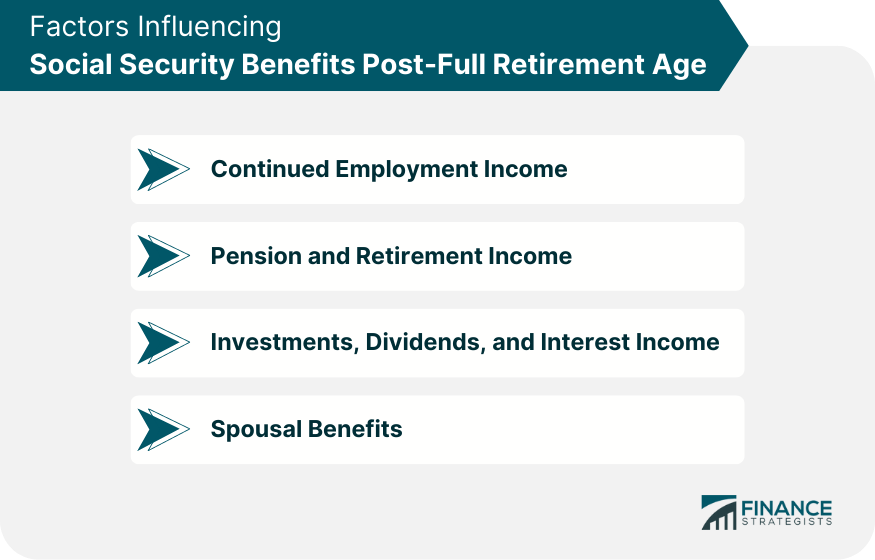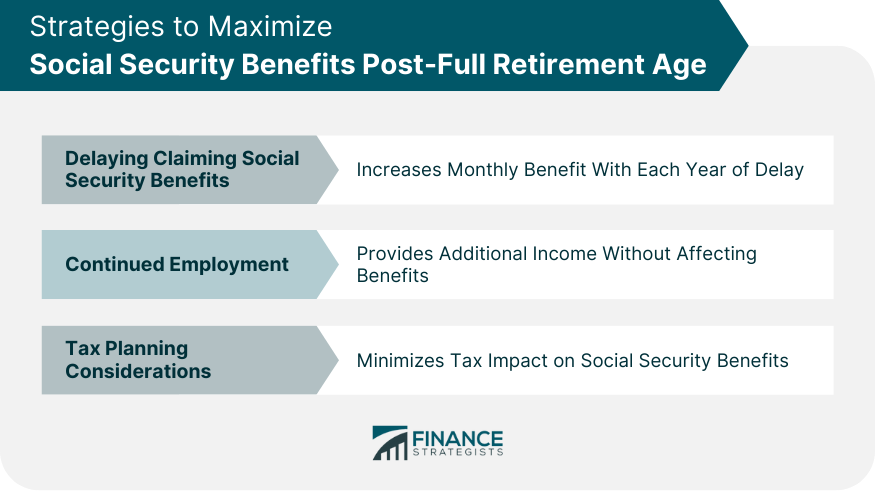Once you reach Full Retirement Age (FRA), there is no limit to how much you can earn while collecting Social Security benefits. For those who are yet to reach full retirement age and have annual earnings exceeding the set yearly limit, their benefit amount might be reduced. For the year 2024, the earnings limit for individuals who have not reached full retirement age stands at $22,320. If your earnings surpass this limit, your benefit payments will be reduced by $1 for every $2 that you earn above this amount. The situation changes slightly during the year you attain full retirement age. In this case, the earnings limit is set at $59,520. If your earnings exceed this limit, for every $3 you earn above it, $1 will be deducted from your benefit payments. After reaching Full Retirement Age, a beneficiary can continue to work and earn income without affecting their Social Security benefits. The more a person earns through work, the greater their total income will be, but their Social Security benefits remain unaffected. Other forms of retirement income, such as pensions or annuities, do not affect Social Security benefits. Regardless of the amount of pension or other retirement income a person receives, their Social Security benefits remain the same. Income from investments, dividends, or interest is not considered earnings for Social Security purposes. Therefore, this income does not affect the amount of Social Security benefits a person receives, irrespective of the Full Retirement Age. Spousal benefits, which provide income to a person based on their spouse's earnings record, are not affected by the person's own earnings after they reach Full Retirement Age. However, these benefits may be reduced if the person claiming them earns above the limit prior to reaching their own Full Retirement Age. There is a strategy of waiting to claim Social Security benefits until after the Full Retirement Age, even up to age 70. By doing so, beneficiaries can increase their benefits by a certain percentage for each year they delay claiming beyond their FRA, resulting in a higher monthly benefit when they do start claiming. Continuing to work after reaching Full Retirement Age can provide additional income without affecting Social Security benefits. It also provides the opportunity to increase future benefits if current earnings are higher than in some earlier years used to calculate the benefit amount. Understanding the tax implications of Social Security benefits can help beneficiaries optimize their overall income in retirement. By effectively managing other income sources and considering the timing of withdrawals from retirement accounts, beneficiaries can potentially minimize the portion of their benefits subject to tax. Medicare premiums are the monthly costs paid by beneficiaries for their Medicare health insurance coverage. These costs vary based on the specific plan and coverage options a beneficiary chooses. The Income Related Monthly Adjustment Amount (IRMAA) is an extra charge applied to the Medicare Part B and D premiums for beneficiaries with higher income levels. The Social Security Administration uses the most recent federal tax return to determine whether a beneficiary must pay IRMAA. While Social Security income limits don't directly affect Medicare premiums, a beneficiary's total income can affect the amount they pay for Medicare Part B and D coverage due to IRMAA. This includes income from work, pensions, and other sources, as well as Social Security benefits. Once you reach Full Retirement Age, there is no earnings limit that would reduce your Social Security benefits. While continued employment, pensions, and other incomes like investments and dividends will not impact your benefits, exceeding the income limit before reaching FRA may lead to reductions. Strategies like delaying your Social Security claims past FRA, working beyond FRA, and effective tax planning can help optimize your retirement income. Spousal benefits also remain unaffected post-FRA, although they may be reduced if the income limit is surpassed before reaching FRA. It's important to note that while Social Security income doesn't directly impact Medicare premiums, your total income, including Social Security, can influence the amount due to the Income Related Monthly Adjustment Amount. In essence, understanding these nuances can ensure you maximize your benefits and navigate your retirement income effectively.What Are Social Security Income Limits After Full Retirement Age?
Factors Influencing Social Security Income Limits Post FRA
Continued Employment Income
Pension and Other Retirement Incomes
Investments, Dividends, and Interest Income
Spousal Benefits Considerations

Strategies to Maximize Social Security Benefits Post-Full Retirement Age
Benefits of Delaying Social Security Benefits
Role of Continued Employment
Considerations for Tax Planning

How Income Limits Affect Medicare Premiums
Explanation of Medicare Premiums
Income Related Monthly Adjustment Amount (IRMAA)
Potential Impact of Social Security Income Limits on Medicare Premiums
Conclusion
Social Security Income Limits After Full Retirement Age FAQs
After reaching Full Retirement Age, the Social Security income limits are no longer applicable. This means beneficiaries can earn an unlimited amount from work without their Social Security benefits being reduced.
After reaching Full Retirement Age, other types of income such as pensions, investments, dividends, and interest do not affect the amount of Social Security benefits. However, they may affect the taxability of these benefits depending on the beneficiary's overall income level.
Yes, delaying Social Security benefits past the Full Retirement Age can result in higher monthly benefits. For each year you delay claiming beyond your FRA, up until age 70, your benefits increase by a certain percentage.
Reaching the Full Retirement Age doesn't directly affect the taxability of Social Security benefits. However, the amount of your benefits that are subject to federal income tax depends on your overall income, including work income, pensions, and other sources.
While Social Security income limits don't directly affect Medicare premiums, your total income, including work income, can affect the amount you pay for Medicare Part B and D coverage due to the Income Related Monthly Adjustment Amount (IRMAA). This includes income from work, pensions, and other sources, as well as Social Security benefits.
True Tamplin is a published author, public speaker, CEO of UpDigital, and founder of Finance Strategists.
True is a Certified Educator in Personal Finance (CEPF®), author of The Handy Financial Ratios Guide, a member of the Society for Advancing Business Editing and Writing, contributes to his financial education site, Finance Strategists, and has spoken to various financial communities such as the CFA Institute, as well as university students like his Alma mater, Biola University, where he received a bachelor of science in business and data analytics.
To learn more about True, visit his personal website or view his author profiles on Amazon, Nasdaq and Forbes.











